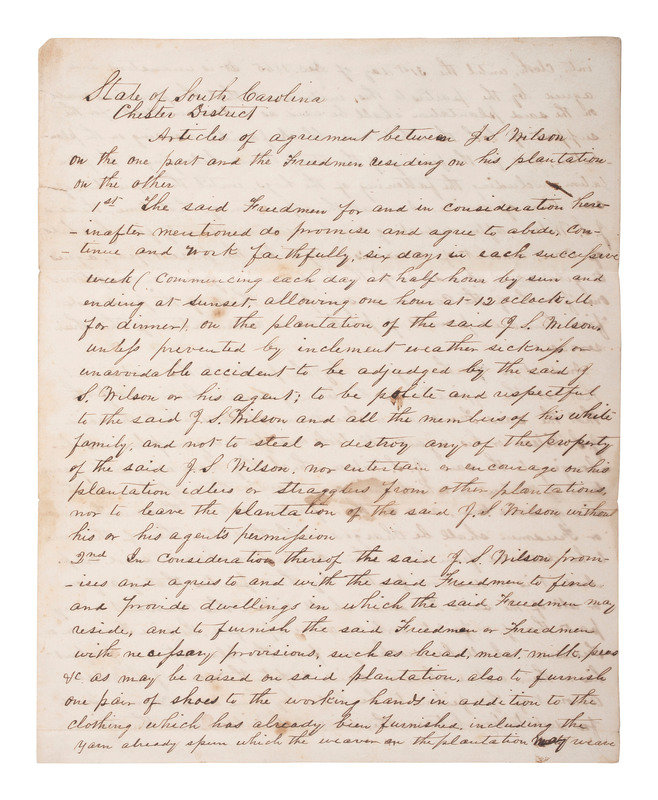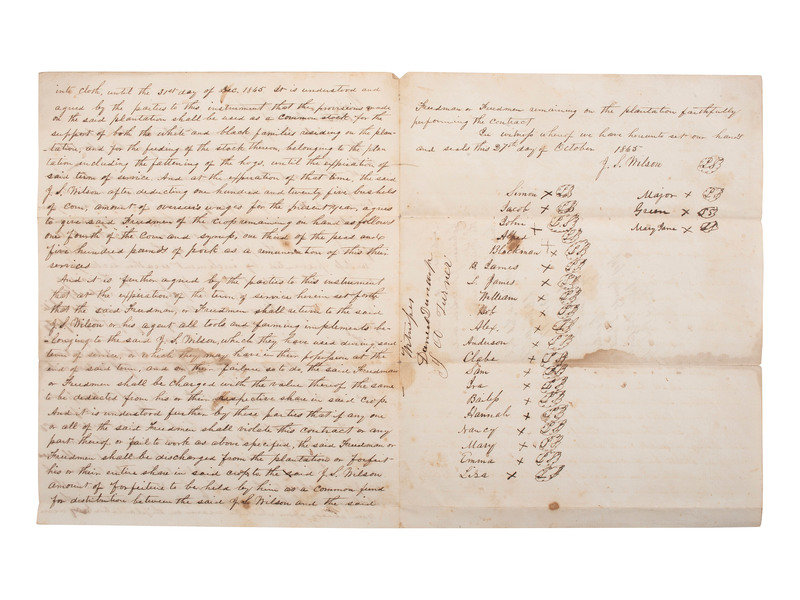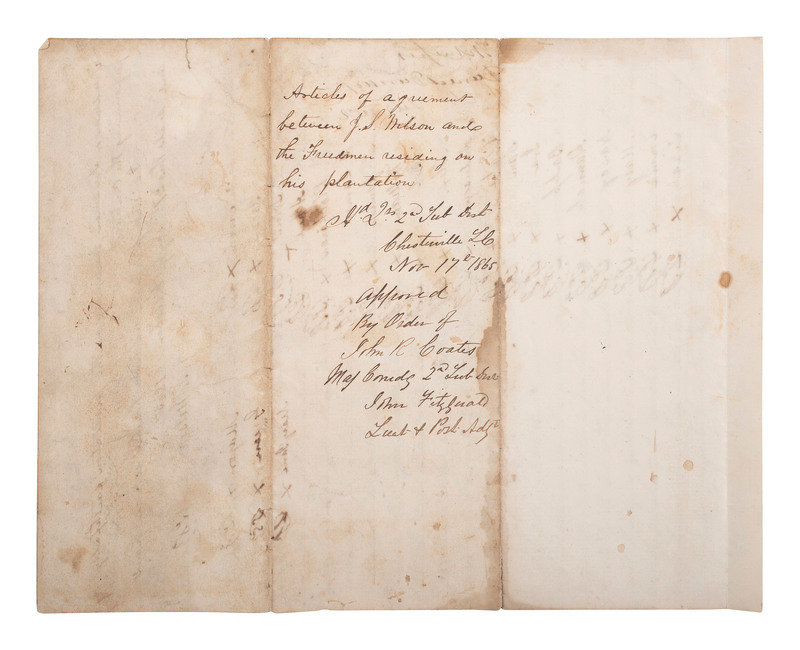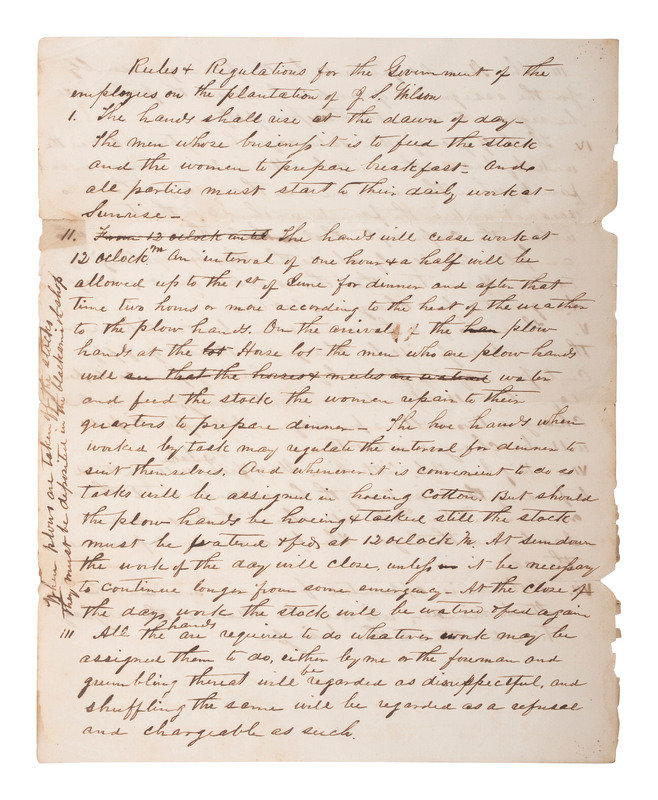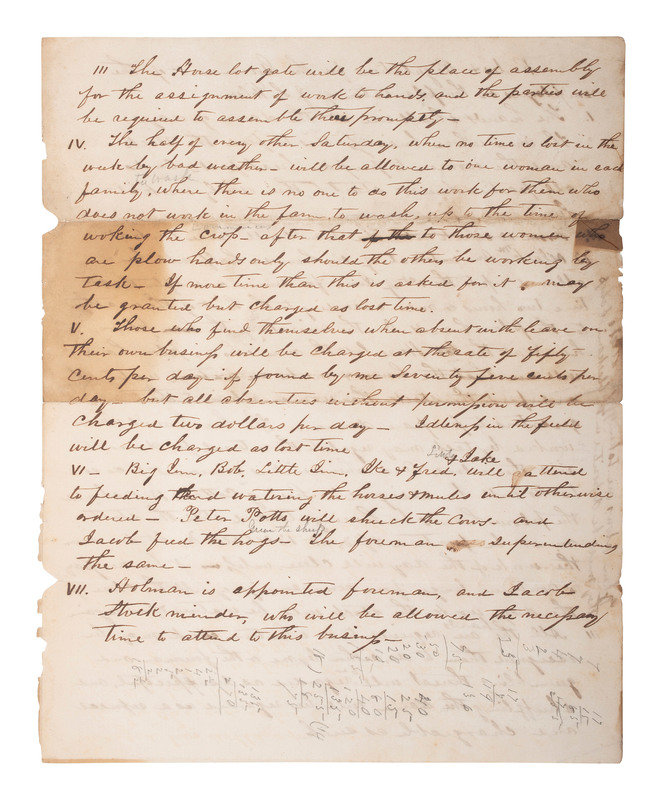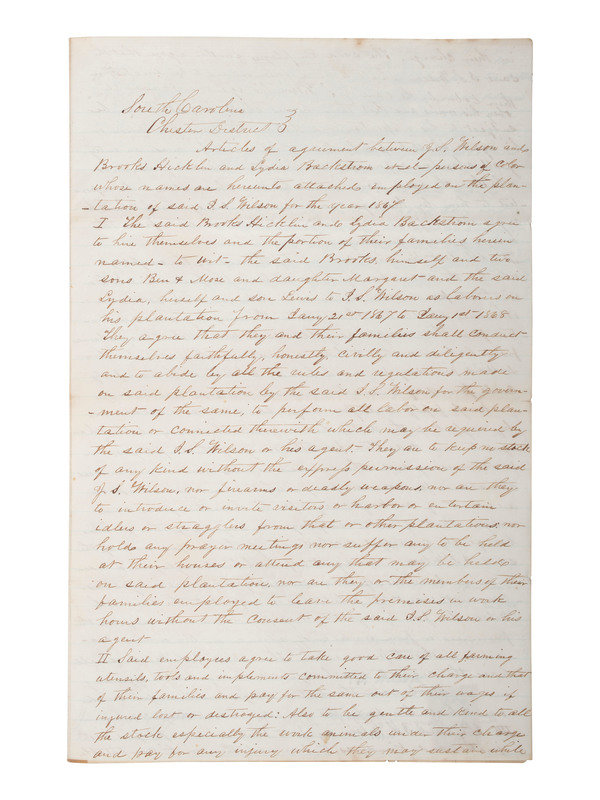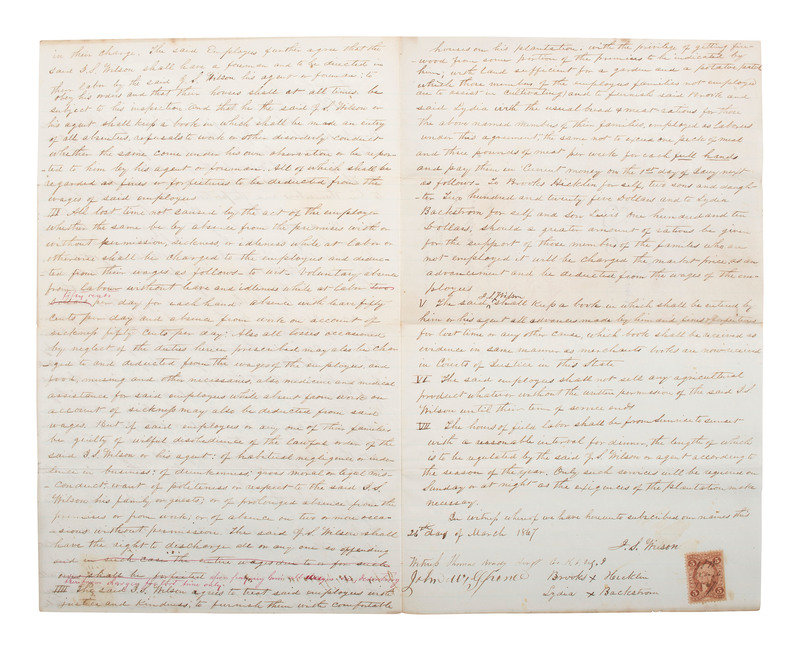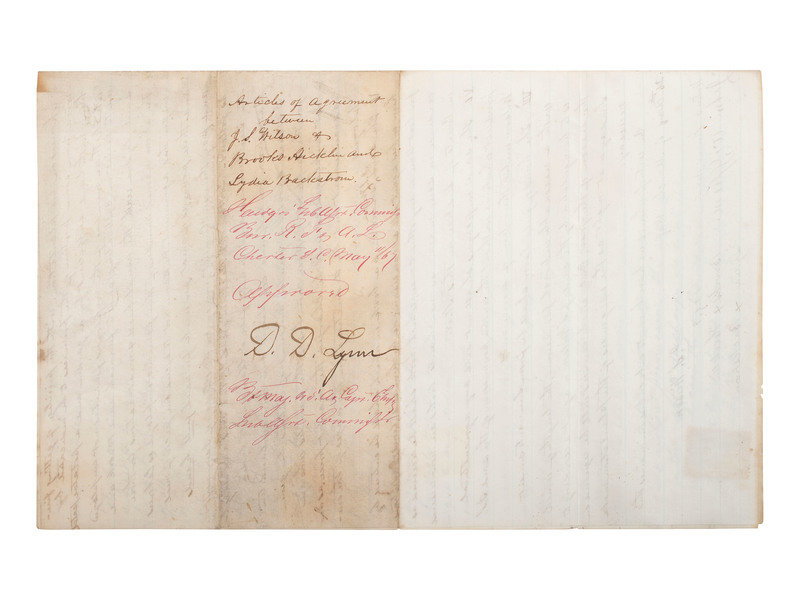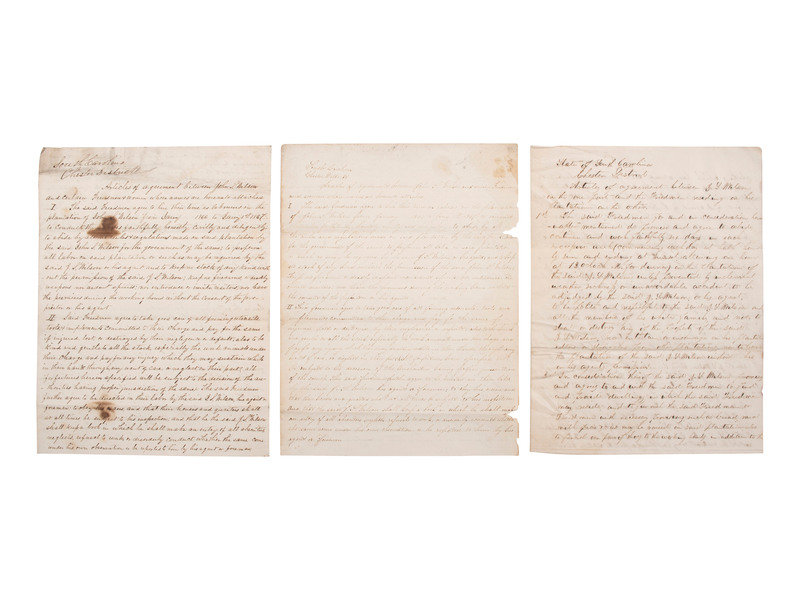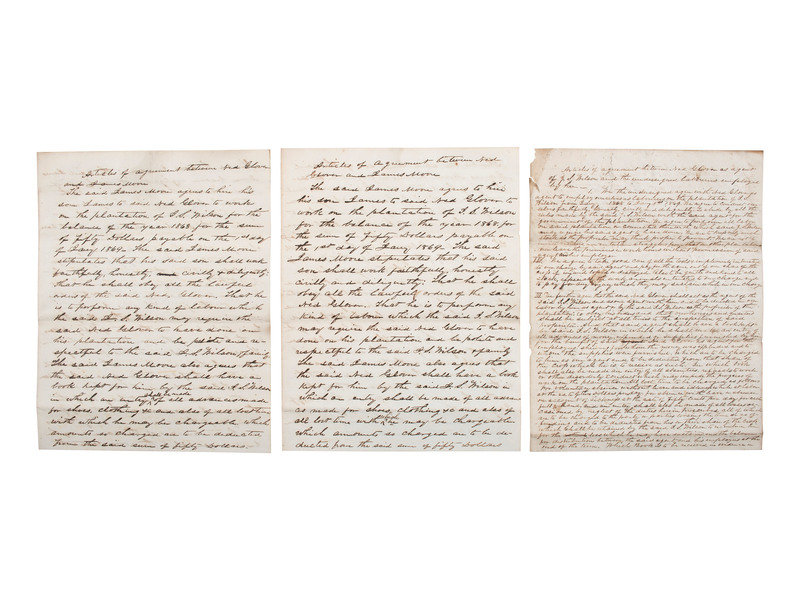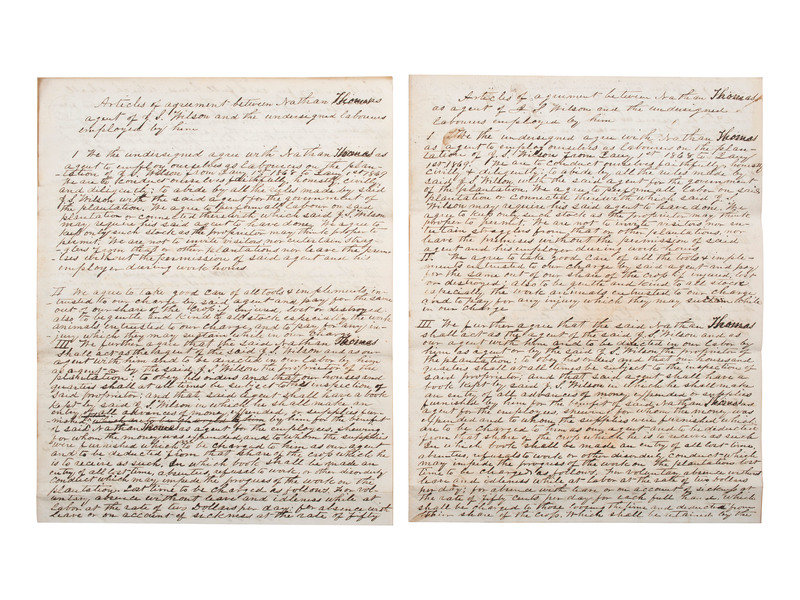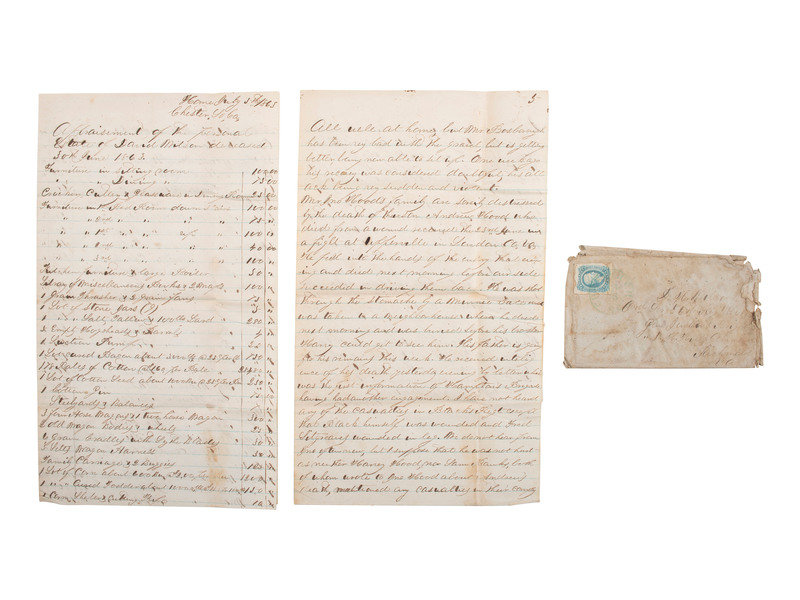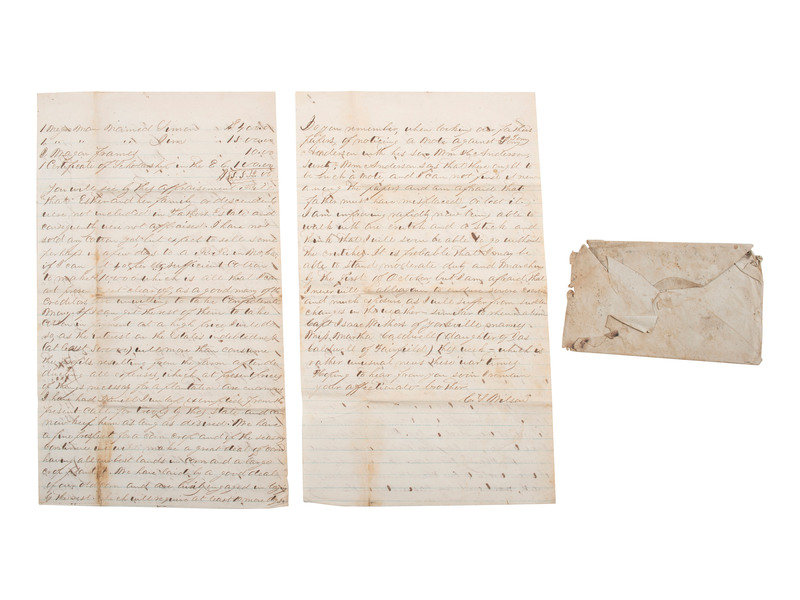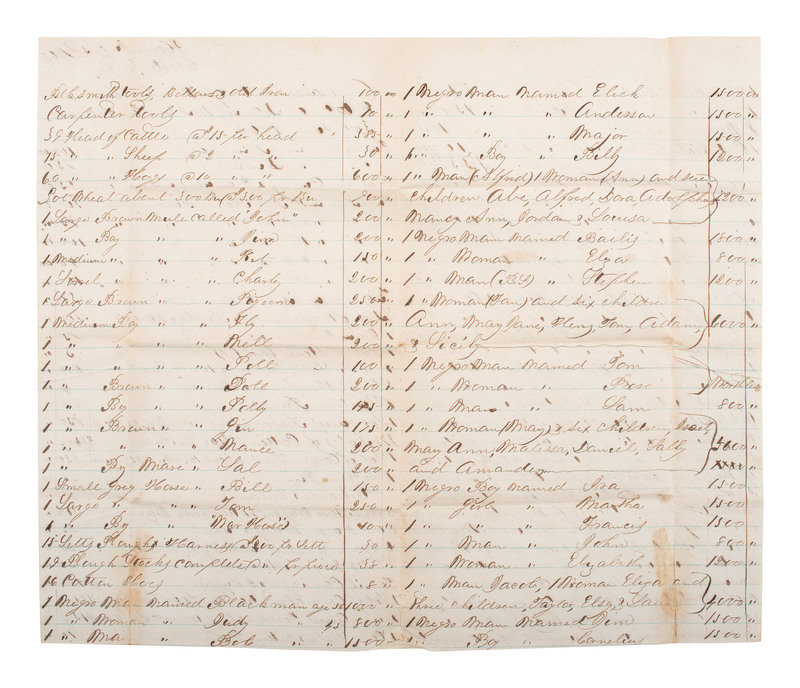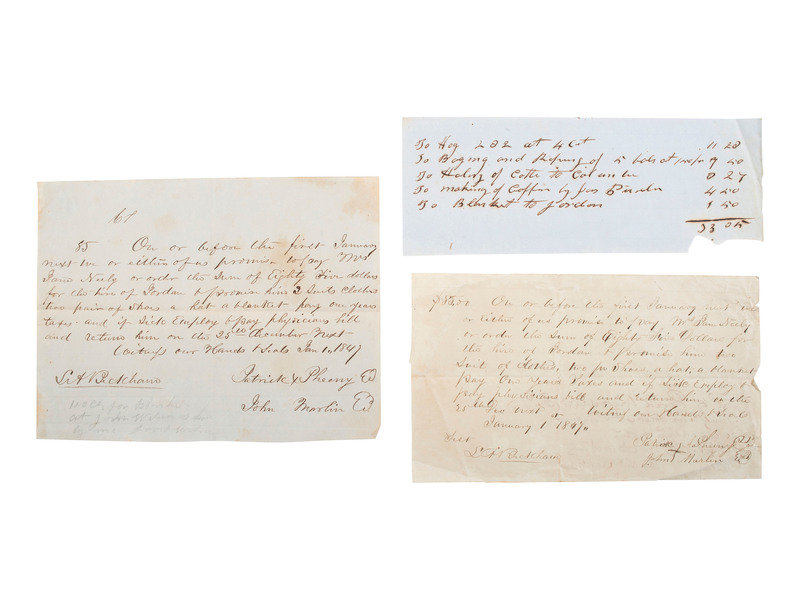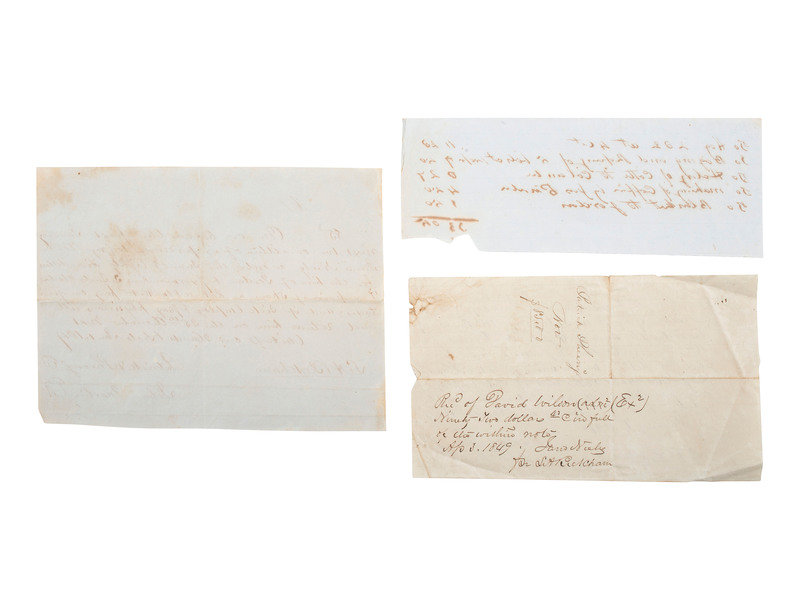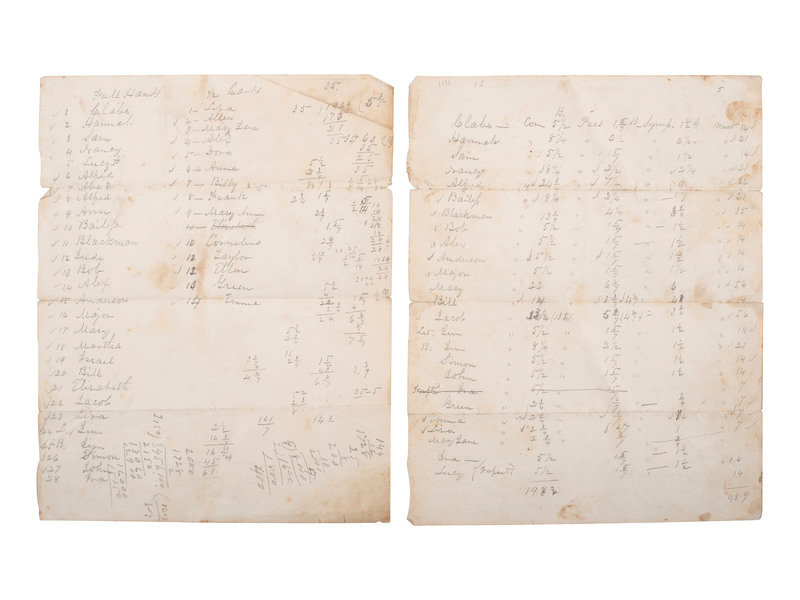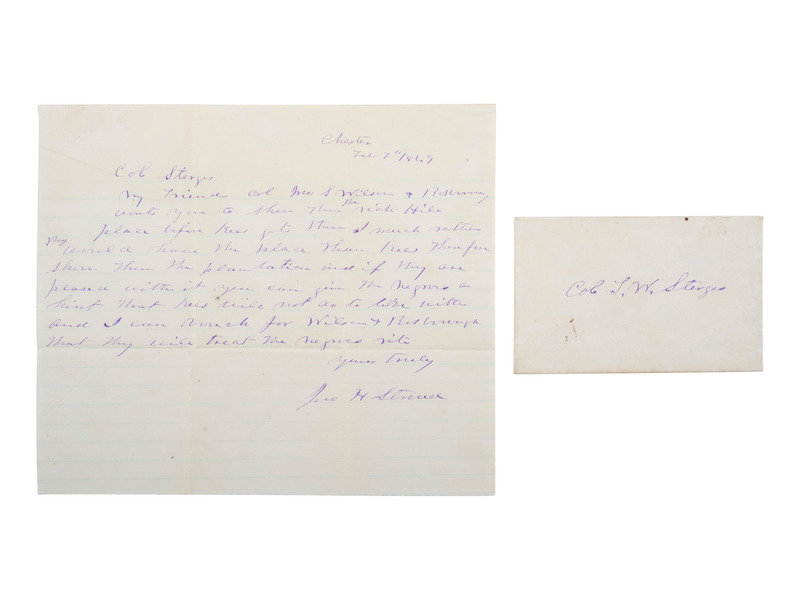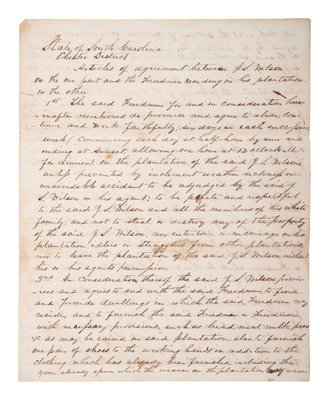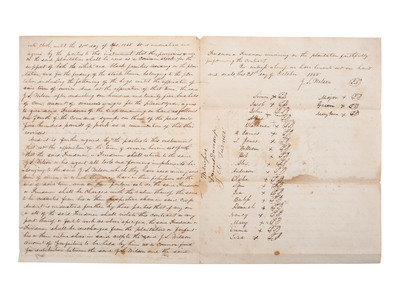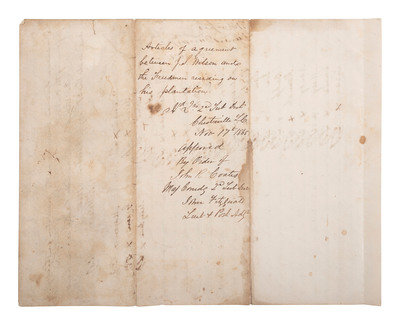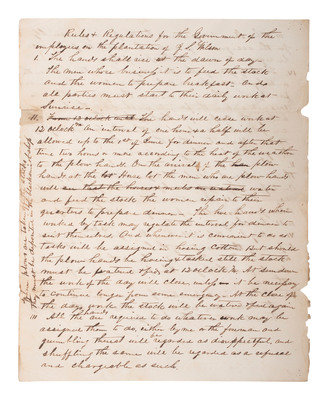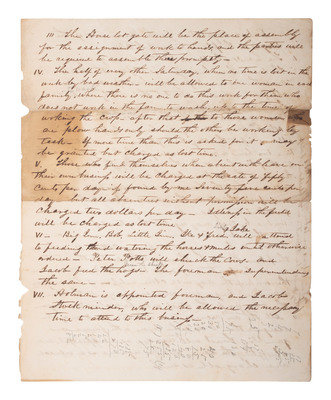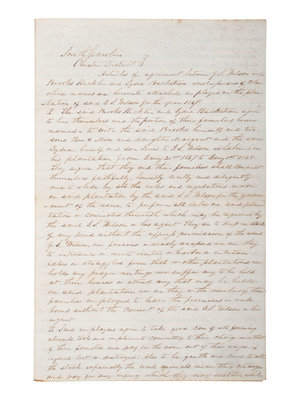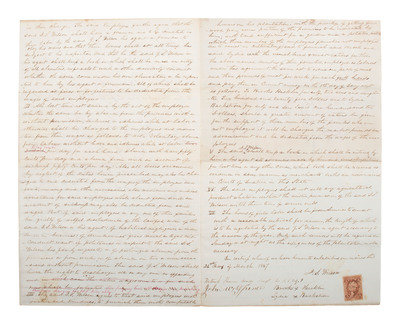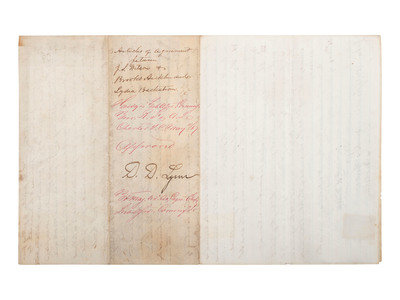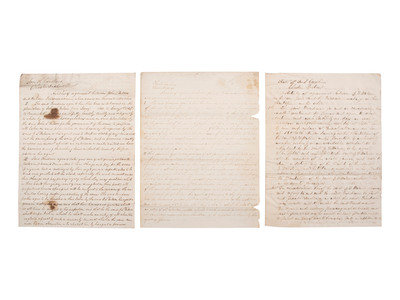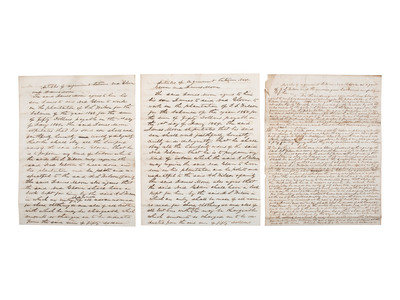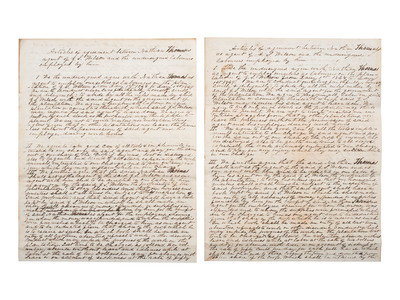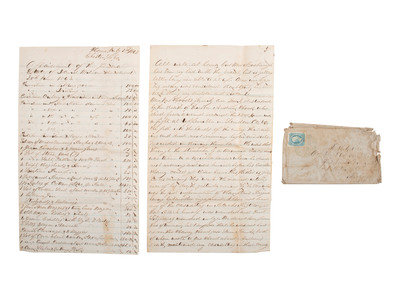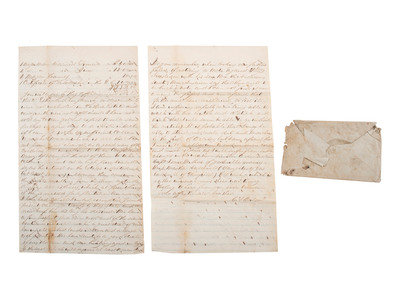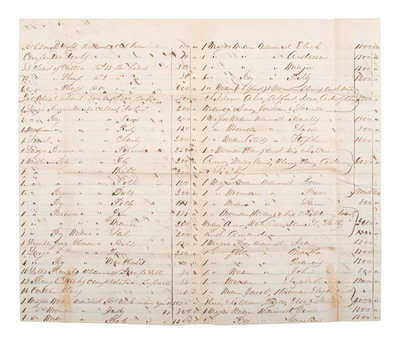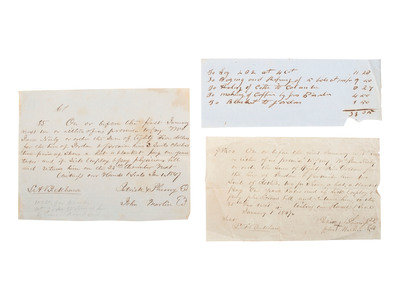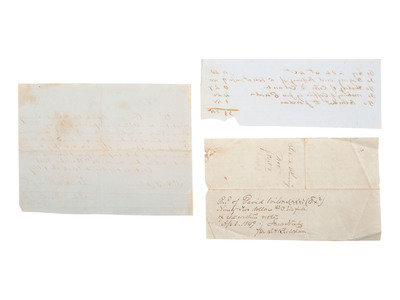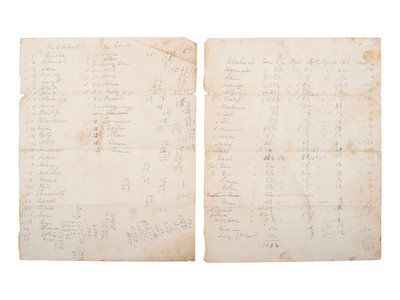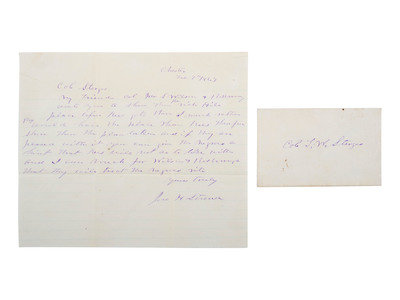Lot 147
"Articles of agreement between J.S. Wilson on the one part and the Freedmen residing on his plantation on the other." 3pp, 8 x 10 in. (creasing and small tears at folds, dampstains). Signed by John S. Wilson, and by 23 freedmen with their marks. Chester District, South Carolina. 27 October 1865. Docketed on verso with approval from South Carolina Freedmen's Bureau field officers: "HdQrs. 2nd Sub Dist / Chesterville SC / Nov 17th 1865 / Approved / By Order of / John R. Coates / Maj Comndg 2nd Sub Dist / John Fitzgerald / Lieut & Post Adjt."
This labor contract between Wilson and freedmen residing and working on his plantation was executed just months after the Civil War ended. The first paragraph reads: "The said Freedmen ... do promise and agree to abide, continue and work faithfully, six days in each successive week (commencing each day at half hour by sun and ending at sunset, allowing one hour at 12 o'clock for dinner) on the plantation of the said J.S. Wilson unless prevented by inclement weather, sickness or unavoidable accident to be adjudged by the said J.S. Wilson and all the members of his white famaily, and not to steal or destroy any of the property of the said J.S. Wilson, nor entertain or encourage on his plantation idlers or stragglers from other plantations, nor to leave the plantation of the said J.S. Wilson without his or his agent's permission." Additional paragraphs outline provisions to be provided by Wilson to the freedmen as well as punishments for violation of the contract. Identified freedmen include Simon, Jacob, Alfred, Blackman, Bob, Anderson, Sam, Ira, Nancy, Mary, Major, and Mary Jane, all of whom are also identified as enslaved "property" on the 1863 manuscript appraisal accompanying the archive.
[With:] "Rules & Regulations for the Government of the employees on the plantation of J.S. Wilson." 2pp, 8 x 10 in. (toning, chipping at edges, creasing at folds). [Chester District, South Carolina.] [ca 1865-1868]. Additional regulations and explanation of duties to be followed by freedmen on the Wilson plantation, including: "All the hands are required to do whatever work may be assigned them to do, either by me or the foreman and grumbling thereat will be regarded as disrespectful, and shuffling the same will be regarded as refusal and chargeable as such... Idleness in the field will be charged as lost time."
[With:] Additional freedmen labor contracts: "Articles of agreement between J.S. Wilson and Brooks Hicklin and Lydia Backstrom et al persons of color whose names are hereunto attached employed on the plantation of said J.S. Wilson for the year 1867." 26 March 1867. Signed by Wilson and by Hicklin and Backstrom with their marks. -- Two "Articles of agreement between Ned Glover and James Moore" in which Moore agrees to hire his son James to Ned Glover to work on the plantation of J.S. Wilson. Both dated 11 April 1868 and signed by Ned Glover and by James Moore. -- "Articles of Agreement" between Ned Glover as agent of J.S. Wilson and the undersigned laborers employed by him." 20 January 1868. Signed by Glover as well as by freedmen "George Winn [sp?]," "Joe Johnston," "Newton McClintock," "Squire Sims," and "Dennis Glover" with their marks. The 1880 US Federal Census locates a "Black" male named Ned Glover residing in Chester, South Carolina, indicating that perhaps the Glover identified in these agreements was a freedmen overseeing the labor of the other freedmen on the plantation. -- Two separate "Articles of Agreement" between Nathan Thomas agent of J.S. Wilson and the undersigned laborers employed by him." 20 January 1868. Both signed by Thomas with his mark, along with freedmen "Jacob Moore," "Hary Young," John Gill," and "Solomon Young" with their marks. -- Three unexecuted "Articles of agreement" beween Wilson and unidentified freedmen, one from 1865 and two dated January 1866.
[Also with:] Manuscript document which identifies 45 freedmen as either "Full Hands" or "1/2 hands," and which lists separately the shares of corn, peas, syrup, and meat due to another identified list of 24 freedmen. 3pp. [ca 1866]. -- Autograph letter to a "Col. Sterges" indicating that the recipient should show "Col. Jno. S. Wilson & Rosborough" a plantation which is apparently available for rent or sale. The author indicates that "I can vouch for Wilson & Rosborough that they will treat the negroes rite." 1p, 7 February 1869.
[Also with:] Manuscript "Appraisement of the personal Estate of David Wilson deceased 30th June 1863." Chester, South Carolina. 5 July 1863. 6pp, 6 5/8 x 11 in. (creasing, light soil, toning). Appraisement identifies 50 enslaved individuals by name, and notes that "Esther and her family or descendants were not included." Signed "C.S. Wilson" by Christopher Scott Wilson (1835-1914), son of the deceased David E. Wilson (1794-1863), and addressed to brother David H. Wilson (1831-1863) who was serving in the Confederate Army. -- Two receipts for hire of the enslaved man "Jordan." Both dated 1 January 1847. Verso of one receipt indicating payment "Rcd of David Wilson" in full for the amount $92.45. Additional receipt indicating payment for a "Blanket to Jordan."
[Also with:] A small group of manuscript sermons authored by William Gaston Rosborough (ca 1763-1807), the first pastor of the Concord Church in Chester District, South Carolina, and relative to John Simonton Wilson's wife, Jane Patton Rosborough (1823-1900). Rosborough was an enslaver who bequeathed multiple enslaved individuals to family members in his last will and testment.
Together, 17 documents plus sermons.
Following the Civil War, the Wilson family's plantation located on Rocky Creek in Chester County, South Carolina, was run by John Simonton Wilson (1820-1902). Wilson had previously served fom 1855-1861 in the South Carolina General Assembly and voted for the Ordinance of Secession on December 20, 1860. He went on to serve as a Captain in Co. D, "The Chester Troop," 1st South Carolina Cavalry. The 1860 US Federal Census Slave Schedule indicates that John S. Wilson and his father, David E. Wilson, enslaved approximately 60 men, women, and children. Many names of enslaved individuals identified in the 1863 appraisement coincide with freedmen identified in the labor contracts, indicating that some freedmen remained at the Wilson plantation after the war.
The regulation of written labor agreements between planters and freedmen was one of the major activities of the Freedmen's Bureau in South Carolina. Still, as evidenced in the documents offered here, post-war labor contracts were structured in accordance with the Southern states' "Black Codes" which attempted to restrict African Americans' freedom, impel them to work for low or no wages, and keep freedmen dependent and subordinate. While the contracts formally outlined terms of employment such as pay, clothing, medical care, the distribution of crops, length of work days, etc., the former enslavers were able to maintain a system of labor which closely approximated the system of enslavement which had existed in the former Confederate states.
An unusually large number of related freedmen documents offering a unique, longitudinal window into the Civil War and post emancipation African American community at the Wilson plantation. Provenance: Archive descended directly through the Wilson family to current consignor.
See also Lot 149 for related material descended through the Wilson/Rosborough family.
